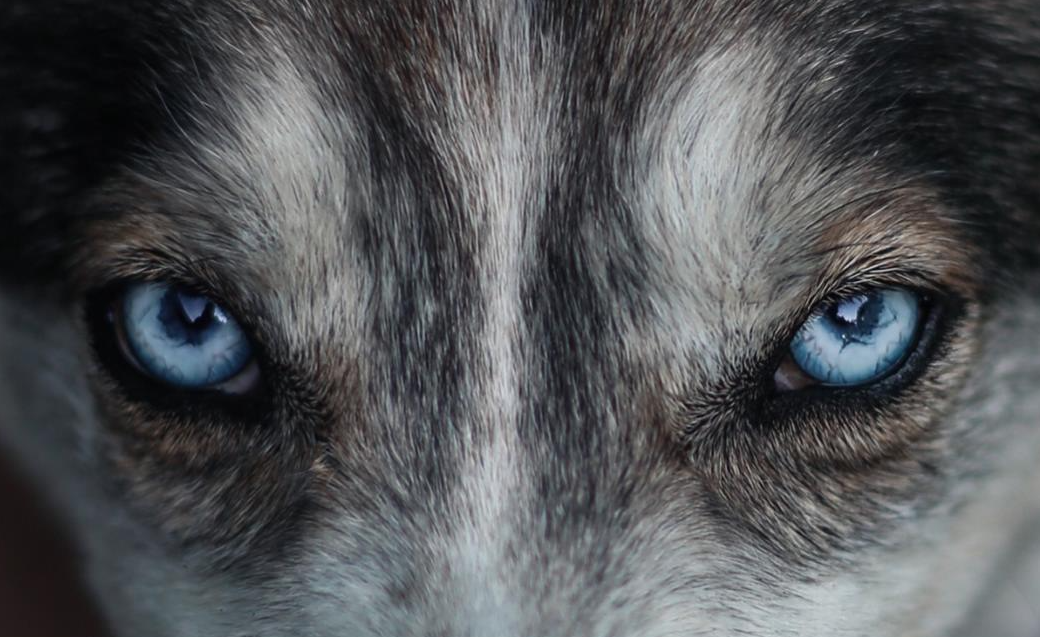The Wolves of Paris
To a girl searching for proof of her own uniqueness, a wolf at a window is a curious thing.
Car lies in bed, knees to her chest, mouth held under a heap of blankets, collecting the heat of her own exhalations.
Behind the bifold shutter, the wolf's shape moves across imperfect seams. She has a curtain that would block out this view, but when it's this cold it's best to keep the curtain atop her with the other blankets.
The snout lifts, floats in search of food-scent. The thin shadow of another passes behind it. The window should’ve been fixed in the fall, but no one could have predicted the winter of 1450 to be this severe. Car shuffles her legs, hides from pockets of cold. She considers the fact that blankets don't provide heat, only trap your own.
The wolves are nocturnal curiosity. The wolves are night's probing tongue.
On more than one occasion, Car has been described as ‘an unfortunate twig of a human.’
A diminutive girl, even her name is a diminutive of a diminutive of a diminutive. Carolane shortens to Carole which truncates to Caro which abridges to Car. Given the French propensity to abandon the final letters of any given word, her name comes out as a melodious and barely pronounced Ca. Like a stifled cough someone tried to sing.
She suspects if she doesn't get married soon, her name might vanish all together.
At fifteen, with a penchant for imagining boys without their clothes on, she has tacitly defined herself as all humans do: unique among the mass of existence but with no clear understanding of how, while patiently waiting for evidence of this belief to present itself. She thinks herself unique despite knowing that all humans think themselves unique, which makes her unique.
She is aware of the irony.
"I saw a wolf last night." In the morning, she tells her mother who scrubs at the washbasin.
The porridge in Car’s bowl is warm but not warm enough to fend off night’s catacomb chill. The pots her mother hangs are valuable and kept far from the window where they might be stolen.
"Going to market later."
"I said a wolf came to the window last night."
"Good thing you have no meat on you."
The wolves are new to Paris, having entered the city's dilapidated defensive walls from the surrounding forest that has been raked clean by the two hundred thousand people who reach out from the ancient city. But people seldom care about failing walls: a wall's disrepair is a gift from peace.
Outside, between houses, the trash barrels haves been knocked over, their contents rummaged and sniffed and tested.
The wolves are the need to survive. The wolves are the forest’s reflexive reach.
When at church, Car passes her time glancing around in search of boys whom she imagines without clothes. It is not a particularly easy task, seeing as how she has never seen a boy her age naked. She has seen older men on two occasions. Once, when her grandfather needed the assistance of two people to get out of bed. The second, at a public beheading where the body lay on the street afterwards.
Both times were a mere glance. Both times didn't quite seem representative of real life.
When service ends, an argument ensues outside the church. It seems Madam LaCour’s child is dead, attacked by wolves. Held in place, the mourning woman screams threats while the men debate whether to let her see the remains of her child. On the far side of the courtyard, Monsieur Clarion holds a wrapped blanket stained in red, his back to the arguing crowd.
Car finds a declaration of curfew nailed to the church door. If it is to be believed, more than just this one child have already been killed.
Atop the holy water floats a thin sheet of broken ice.
Car's boyfriend's name is Etienne. They have kissed twice. She has not seen him naked.
He works at the dock and speaks almost exclusively of his future successes without providing a means by which he will accomplish them. Two years older than her, he doesn't like the word boyfriend or use the word girlfriend and will not let her tell anyone they have met a few times at night.
Car often fixates on the word boyfriend, which holds within it the connotation of worthiness, but not as much as the word fiancé, which she one day looks forward to using so everyone can see that she's valued and therefore valuable.
At night, they meet in an alley behind the pub he frequents.
"You smell good."
"Like what?" The quickness of her response betrays her neediness.
He licks her lips. "Don't know." He sucks on her neck. He makes her feel not so thin. She can see her own breath and he smells of beer and she asks, "Can I see you naked?"
The sucking on her ear is too loud.
"It's cold," he says and takes her hand, guides it under his clothing, and she feels, explores, without aim or knowledge of any desire that might exist beyond exploration. What she’s done to his body is physical proof of her desirability.
Down the street, the pale glint of a wolf’s eye flashes across the intersection. It pauses, assesses them as Etienne's hand makes explorations of its own.
When the wolf moves on, an entire pack follows behind it.
The wolves are moving grey famine. The wolves are a skin-hugged rebuttal to a city's plunder.
Dozens are dead.
The eight-year-old daughter of a merchant. A homeless man under a bridge. It's hard to know what’s rumor and what’s real. The poor are the hardest hit.
Car's family is not poor but not rich. Her blankets are thick and supple – her favorite possessions – and if she complains of the cold, she'll be told to put some meat on her bones. If she asks for more blankets, her father will chuckle and tell her to sleep with the rest of the family like a normal person. She refuses.
The room she has claimed as her own is actually a large storage closet, at one point used to store barrels of mead when their house was a store. The rest of the house is definitely warmer, but having her own space makes her feel in control and fascinating.
At night, in the room that isn't a room but is hers, she masturbates without knowing the word masturbate, unaware that she is not the first to discover such a thing.
At first, she impersonates Etienne's finger, which itself had uncomfortably impersonated intercourse, but soon she finds something decidedly better, simultaneously delicate and seismic.
Her mind sets on the feel of Etienne's hardness. She climaxes without knowing there is such a thing and is somewhat startled, and when the wolf comes back, she's already looking at the window, her head lolled to the side, mouth breathing little clouds just beyond the frontier of blankets, confused about what just happened, unafraid, so certain this animal understands her.
The wolves are innocent desire. The wolves are nature's exploratory touch.
Car can't wait to be older but knows when she's older she'll want to be young again, which means there must be a day in between where she's exactly happy with her age and wonders if that'll be the day she and Etienne will announce themselves to the world.
Etienne has spoken of their future only once. It's hard to get him to speak of it again.
The people of Paris have given a name to the leader of the pack. The largest reddish wolf with a missing tail. They call him Courtaud. Marie Claire next door writes a song about him and sings it in the street.
As the wolves grow bolder, King Charles and the city's government present no plan other than declaration that the curfew is now enforceable by police. So men begin speaking of organizing a militia.
Behind the pub, Etienne's hands feel colder than they should on Car’s belly. The curfew makes it easier to see him now, makes it easier to be out at night.
She waits for the heat of the moment. "Should we get married?"
"Boss has me carting now 'stead of working the dock."
"Should I come visit you?"
His face buries into her neck. Her mouth parts. He moves quickly, hikes her dress, exposes her to night's cold. In the days to come, an assembled militia, including her mourning father, will gather and drive the wolves onto Île de la Cité, where they will be surrounded and beaten before the cathedral of Notre Dame.
Over Etienne's shoulder, Car sees the pack collect, shift, their focus maniacal and confident as Etienne works and she is unique and wanted and there are things more important than curfew.
Ryan Deegan
Ryan Deegan lives in the deserts of Las Vegas, where he masquerades as an airline pilot by day so that he might write stories by night. His primary focus is long form fiction. You can find out more or connect with Ryan at ryandeeganauthor.com.

